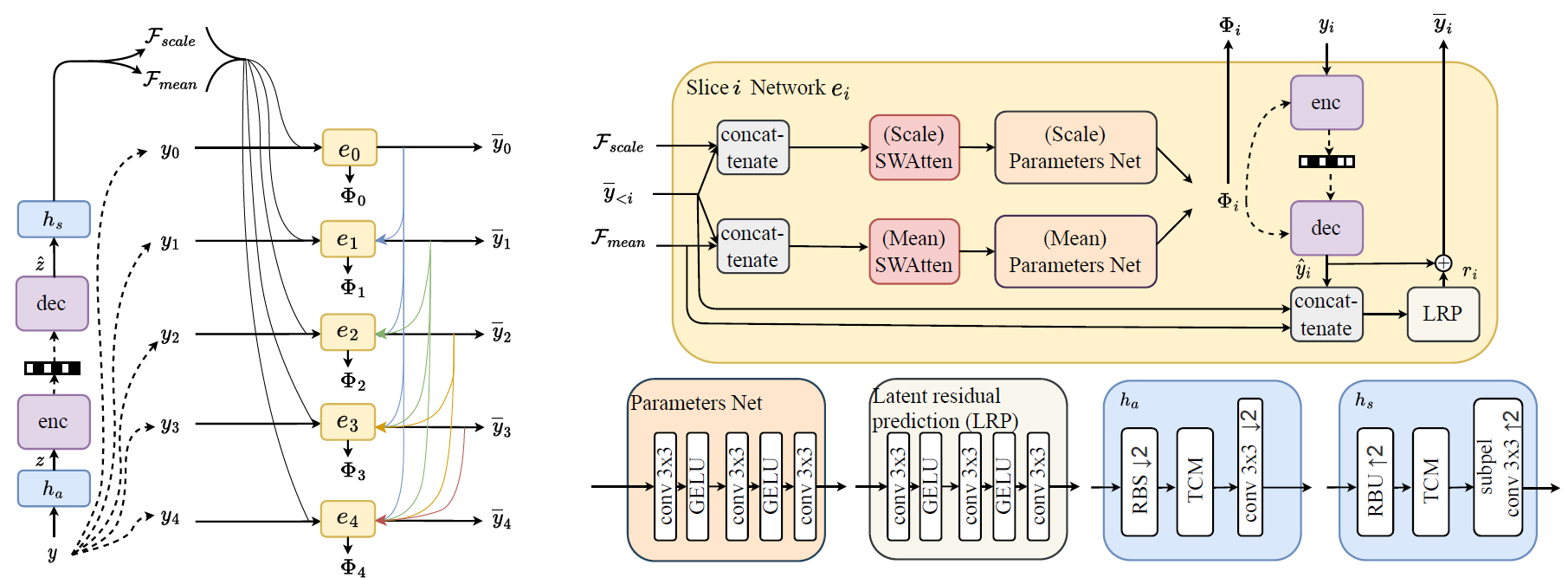This is the Pytorch repository of the paper "Learned Image Compression with Mixed Transformer-CNN Architectures".
Please feel free to contact Jinming Liu (jmliu@toki.waseda.jp) or Heming Sun if you have any questions.
A TensorFlow2 implementation of LIC-TCM is also provided by Nikolai10.
Learned image compression (LIC) methods have exhibited promising progress and superior rate-distortion performance compared with classical image compression standards. Most existing LIC methods are Convolutional Neural Networks-based (CNN-based) or Transformer-based, which have different advantages. Exploiting both advantages is a point worth exploring, which has two challenges: 1) how to effectively fuse the two methods? 2) how to achieve higher performance with a suitable complexity? In this paper, we propose an efficient parallel Transformer-CNN Mixture (TCM) block with a controllable complexity to incorporate the local modeling ability of CNN and the non-local modeling ability of transformers to improve the overall architecture of image compression models. Besides, inspired by the recent progress of entropy estimation models and attention modules, we propose a channel-wise entropy model with parameter-efficient swin-transformer-based attention (SWAtten) modules by using channel squeezing. Experimental results demonstrate our proposed method achieves state-of-the-art rate-distortion performances on three different resolution datasets (i.e., Kodak, Tecnick, CLIC Professional Validation) compared to existing LIC methods.
The overall framework.
The proposed entropy model.
RD curves on Kodak.
In the code, N refers to 1/2 of C in the paper, as it represents the number of channels used to be input into the Tensformer and CNN networks respectively. Therefore, for the Small/Middle/Large model, N should be set as 64/96/128.
CUDA_VISIBLE_DEVICES='0' python -u ./train.py -d [path of training dataset] \
--cuda --N 128 --lambda 0.05 --epochs 50 --lr_epoch 45 48 \
--save_path [path for checkpoint] --save \
--checkpoint [path of the pretrained checkpoint]
python eval.py --checkpoint [path of the pretrained checkpoint] --data [path of testing dataset] --cuda
| N | Lambda | Metric | Link |
|---|---|---|---|
| 128 | 0.05 | MSE | link |
| 64 | 0.05 | MSE | link |
| 64 | 0.025 | MSE | link |
| 64 | 0.013 | MSE | link |
| 64 | 0.0067 | MSE | link |
| 64 | 0.0035 | MSE | link |
| 64 | 0.0025 | MSE | link |
https://github.com/ZhengxueCheng/Learned-Image-Compression-with-GMM-and-Attention
https://github.com/Googolxx/STF
https://github.com/Nikolai10/SwinT-ChARM
Noted that when our work was completed, the SwinT-ChARM did not yet have the open source code. Therefore, we use our own reproduced results in the paper. For the entropy model in the reproduced code, we use a similar setup of convolutional layers in this code.
This implementations are not original codes of our CVPR2023 paper, because are rearranged by us. This repo is a re-implementation, but the core codes are almost the same and results are also consistent with original results.
@inproceedings{liu2023tcm,
author = {Liu, Jinming and Sun, Heming and Katto, Jiro},
title = {Learned Image Compression with Mixed Transformer-CNN Architectures},
booktitle = {Proceedings of the IEEE/CVF Conference on Computer Vision and Pattern Recognition},
pages={1--10},
year = {2023}
}



